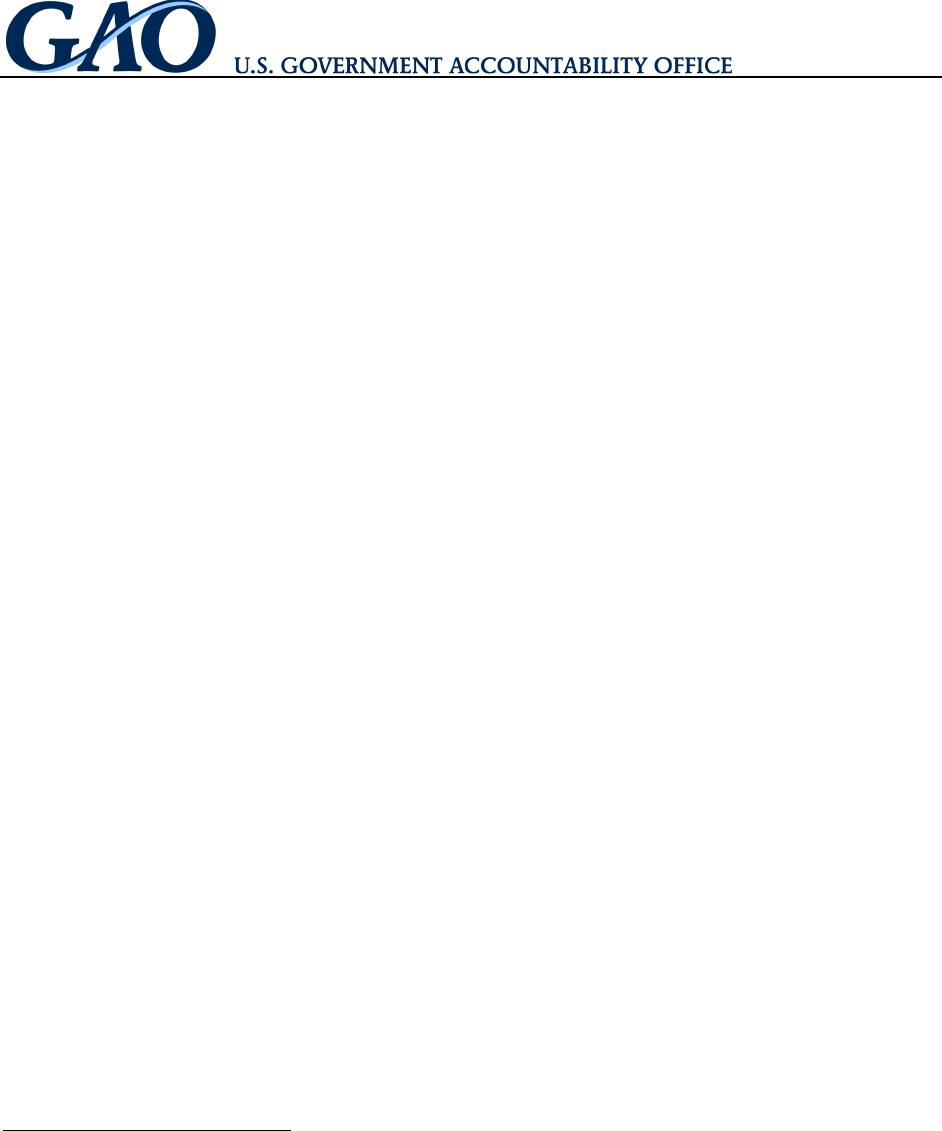
Page 1 GAO-21-139R Wildlife Trafficking and Human Rights
441 G St. N.W.
Washington, DC 20548
October 2, 2020
The Honorable Raúl M. Grijalva
Chairman
The Honorable Rob Bishop
Republican Leader
Committee on Natural Resources
House of Representatives
Combating Wildlife Trafficking: Agencies Work to Address Human Rights Abuse
Allegations in Overseas Conservation Programs
Wildlife trafficking—the poaching and illegal trade of wild animals—is a multibillion-dollar, global
criminal activity that is both a conservation issue and a security threat, according to the
Department of State (State). Estimates place wildlife trafficking among the leading types of illicit
trade. According to a 2014 report from the United Nations Environment Programme, different
sources have estimated the illegal trade in wildlife to be worth between $7 billion and $23 billion
annually.
1
Wildlife trafficking undermines conservation efforts, fuels corruption, and destabilizes
communities that depend on wildlife for biodiversity and ecotourism. Wildlife trafficking also is
pushing some protected and endangered species to the brink of extinction. In response, the
U.S. government has taken steps to combat wildlife trafficking across the globe. From fiscal
years 2014 through 2020, the U.S. government provided approximately $554 million to
undertake a range of activities to combat wildlife trafficking through federal agencies and in
cooperation with partner organizations in the field.
According to international and non-governmental organization (NGO) reports, an estimated
1,000 park rangers were killed in the line of duty worldwide from 2004 to 2014. On average, one
ranger died every 4 days during that period.
2
However, NGO and media reports, including a
series of articles from BuzzFeed News, have recently alleged that organizations that received
U.S. funding have supported park rangers who have themselves committed human rights
violations while combatting wildlife trafficking, including sexual assault and extrajudicial killings.
3
Among the victims of these alleged abuses are indigenous and other people living near
protected wildlife areas in Africa and Asia.
You asked us to review human rights protection mechanisms and monitoring, among other
things, related to U.S. efforts to combat wildlife trafficking. Because of impacts to government
operations related to coronavirus disease (COVID-19), including inability to travel, we were
1
C. Nellemann et al., eds., The Environmental Crime Crisis—Threats to Sustainable Development from Illegal
Exploitation and Trade in Wildlife and Forest Resources (Nairobi: United Nations Environment Programme, 2014).
See also GAO, Combating Wildlife Trafficking: Agencies Are Taking a Range of Actions, but the Task Force Lacks
Performance Targets for Assessing Progress, GAO-16-717 (Washington, D.C.: Sept. 22, 2016).
2
United Nations Environment Programme, The Environmental Crime Crisis, “Our Story,” The Thin Green Line
Foundation, accessed July 13, 2016, at https://www.thingreenline.org.au/story/. See also GAO-16-717
3
“WWF Funds Guards Who Have Tortured and Killed People,” BuzzFeed News, March 4, 2019. The article does not
specifically say that the rangers were in units that directly received U.S. funds.

Page 2 GAO-21-139R Wildlife Trafficking and Human Rights
unable to assess monitoring and focused on two objectives. As discussed with your staff, this
report examines 1) what enforcement mechanisms agencies have to prevent U.S. funded efforts
to combat wildlife trafficking from supporting human rights abuses and how they implement
them, and 2) how agencies and implementing partners address allegations of human rights
abuses.
To address our objectives, we spoke with agency officials and implementing partner
representatives in person in Washington D.C. and overseas by phone, and collected and
analyzed information related to agency and implementing partner program implementation. Our
work focused on State, Department of the Interior (Interior) Fish and Wildlife Service (FWS), and
U.S. Agency for International Development (USAID) activities in Central Africa and Nepal. We
also spoke with key implementing partners: the World Wildlife Fund (WWF), the Wildlife
Conservation Society (WCS), and African Parks (AP).
We conducted this performance audit from September 2019 to October 2020 in accordance with
generally accepted government auditing standards. Those standards require that we plan and
perform the audit to obtain sufficient, appropriate evidence to provide a reasonable basis for our
findings and conclusions based on our audit objectives. We believe that the evidence obtained
provides a reasonable basis for our findings and conclusions based on our audit objectives.
Background
U.S. Agencies Support Park Ranger Activities Overseas
U.S. agencies provide training and equipment for park rangers overseas to combat wildlife
trafficking and protect natural landscapes.
• State: The International Narcotics and Law Enforcement Affairs Bureau (INL) has
provided a range of grants that support park rangers overseas. These include, for
example, a 2017 grant of approximately $940,000 for uniforms, equipment, and training
for 450 rangers in several countries, such as Zambia and Malawi, and a 2019 grant of
approximately $1.6 million for similar purposes in Central Africa. From fiscal years 2014
through 2019, INL funding for awards that include park ranger support overseas was
approximately $55 million, according to an INL officials.
• USAID: From fiscal years 2014 through 2017, USAID provided approximately $89 million
globally for park ranger-related activities, according to a USAID official. USAID provides
support equipment, such as rations or GPS units, and skills training on law enforcement,
wildlife ecology, navigation, and first aid.
• FWS: For fiscal years 2013 to 2018, FWS gave us data indicating that its International
Affairs program provided $117 million, about half of which came from USAID’s Central
Africa Regional Program for the Environment (CARPE), to overseas projects that
included a component for park rangers. For example, in fiscal year 2017, FWS provided
an estimated $5.5 million in funding to park ranger activities under the CARPE program,
according to FWS officials. An FWS official told us that this funding supports capacity
building of foreign partners, including support for park rangers, in protected areas in
Central Africa. The FWS official estimates that the agency supported about 1,900 park
rangers through CARPE funds in fiscal year 2018 and told us that support to park ranger
activities includes training on the Spatial Monitoring and Reporting Tool (SMART), used

Page 3 GAO-21-139R Wildlife Trafficking and Human Rights
to track information from patrols in real time, which improves surveillance. FWS park
ranger training may also include combat techniques.
4
Multiple Sources Have Reported Allegations of Human Rights Abuse by Park Rangers
Multiple sources have documented allegations of human rights abuses by park rangers
occurring since the mid-2000s in Cameroon, the Democratic Republic of the Congo (DRC),
Gabon, India, Nepal, and the Republic of Congo, including in areas where the U.S. operates
programs such as CARPE. We did not independently review or corroborate these allegations.
NGOs and news media have collected testimonies and carried out investigations that allege
these human rights abuses occurred in or near national parks in these countries. These reports
include allegations against park rangers, who have received support from WWF, WCS, and AP,
which receive funding through CARPE and other sources. These allegations claim that park
rangers have committed rape, including gang rape and rape of a minor, murder, torture, forced
labor, arbitrary detention, destruction of property, and illegal house searches. For example,
multiple sources have alleged that human rights abuses occurred at Salonga National Park,
DRC. One NGO conducted 231 interviews in 2018 with locals near the park and found that 56 of
the interviewees reported that park rangers had physically abused them, and 58 reported that
rangers had destroyed their property. Multiple sources report that locals at Chitwan National
Park, Nepal, also claimed human rights abuses, including park rangers allegedly torturing and
killing a man in 2006 and beating pregnant women in 2011.
Some sources allege that the existence and management of conservation areas have
detrimental effects on the self-determination and livelihoods of locals and indigenous peoples.
They also allege that some implementing partners have forcibly relocated locals and indigenous
peoples, which would contradict some of their stated principles to uphold the rights of
indigenous peoples and secure free, prior, and informed consent before relocating people or
creating a park.
5
Other sources state that conservation restrictions due to the creation and
management of national parks prevent local people from accessing traditional lands and
carrying out subsistence activities, such as hunting, fishing, and farming, contributing to their
malnutrition.
U.S. Agencies Vet Park Rangers for Violations of Human Rights before Providing U.S.
Support
Statutory provisions commonly referred to as “Leahy Laws” prohibit the U.S. government from
using certain funds to assist units of foreign security forces where there is credible information
that the unit has committed a gross violation of human rights.
6
The Foreign Assistance Act of
1961 defines gross violations of internationally recognized human rights to include torture or
cruel, inhuman, or degrading treatment or punishment; prolonged detention without charges;
4
According to FWS, “combat techniques” refer to applying non-lethal techniques of self-defense and learning how to
diffuse a combative situation, such as an aggressive and armed attack by a poaching gang.
5
For example, WWF recognizes that indigenous peoples have the right to determine priorities and strategies for the
development or use of their lands, territories, and other resources, including the right to require that states obtain their
free and informed consent prior to the approval of any project affecting those lands, territories, and resources. See
Indigenous Peoples and Conservation: WWF Statement of Principles, WWF, 2008.
6
See 22 U.S.C. § 2378d (applicable to assistance furnished under the Foreign assistance Act of 1961 and the Arms
Export Control Act) and 10 U.S.C. § 362 (applicable to amounts made available to the Department of Defense).

Page 4 GAO-21-139R Wildlife Trafficking and Human Rights
causing the disappearance of persons by the abduction and clandestine detention of those
persons; or other flagrant denial of the right to life, liberty, and the security of persons.
7
State
and USAID generally consider park rangers to operate within units of a foreign security force—
authorized to use force, search, detain, or arrest—and therefore subject to Leahy vetting,
according to agency officials.
State does not vet every unit that patrols a park for human rights abuses prior to providing U.S.
support to park rangers. For example, some park rangers who receive U.S. support work
alongside armed authorities of the host government, such as the military. State, however, does
not vet the armed authorities of the host government if they do not receive U.S. funds.
According to FWS officials, Interior may administer funds appropriated under the Foreign
Assistance Act through interagency agreements with State or USAID, and the Leahy Laws may
therefore be applicable to these funds depending on the type of interagency agreement and the
authorities that apply. Funds directly appropriated to FWS for similar conservation efforts
internationally but not provided under the Foreign Assistance Act are not subject to Leahy
vetting, according to those officials. When State or USAID provides funding to FWS that it then
uses to support park rangers activities, FWS submits the candidates’ applications to State for
vetting. According to a State official, Leahy approval of a security force unit is good for 1 year,
and State must vet individuals again if their unit continues to receive support from State or
USAID funding sources.
U.S. Agencies and Implementing Partners Took Steps to Respond to Allegations of
Human Rights Abuses
U.S. Agencies Responded to Allegations of Human Rights Abuses in Different Ways
U.S. agencies responded to allegations of human rights abuses in a number of ways. State
officials at headquarters told us that they were surprised to hear of the allegations in articles
from the news organization BuzzFeed News, especially because they expected embassies and
NGOs to have reported these allegations directly to them even though State was not operating
programs in areas where allegations surfaced. A State INL official told GAO in July 2020 that
State had not given any grants to WWF since October 2019 and that State is awaiting results of
a WWF internal investigation. A State official in the Central Africa region told GAO that INL is
not aware of allegations of human rights abuse committed by INL-supported park rangers in the
DRC, and that the embassy’s vetting program has very strict control mechanisms. In addition,
INL in the DRC requested quarterly reports to facilitate a review of all assistance to park rangers
to ensure that any reported activities were vetted according to Leahy Laws.
USAID officials told us that they were unaware of the breadth of allegations made by BuzzFeed
News. According to USAID officials, staff in Central Africa had previously heard about
accusations related to other sites in Tumba Lediima, a park in DRC. Officials we spoke with at
the USAID Mission in Nepal said they were aware of the 2006 Chitwan National Park incident,
specifically described in a Buzzfeed News article, but had not heard of any human rights abuses
in the park since.
8
7
See 22 U.S.C. § 2151n(a) and 22 U.S.C. § 2304(a)(4). While these definitions do not apply to the Leahy provision
codified at 22 U.S.C. § 2378d, the State Department has adopted them in implementing its Leahy vetting program.
8
In March 2019, BuzzFeed News reported allegations that park rangers at Chitwan National Park in Nepal had
tortured a farmer to death in 2006, and that as a result three park officials, including the chief warden, were arrested

Page 5 GAO-21-139R Wildlife Trafficking and Human Rights
USAID officials told us that in addition to continuing Leahy vetting, USAID took steps in
response to the allegations, including strengthening awareness and training related to human
rights and conducting a site visit. USAID worked to increase awareness of Leahy vetting and
human rights issues across its programs by providing additional training and guidance,
according to an official. For example, USAID Central Africa implemented refresher trainings for
park rangers with an emphasis on human rights and added mandatory training modules on
human rights to the curriculum. Based on an assessment of engagement with indigenous
peoples, USAID also developed and disseminated a guide to facilitate compliance with policy
issued in March 2020. USAID designed the policy to ensure that staff and implementing
partners respect the rights of indigenous peoples and engage them as meaningful partners in
the development process.
9
In response to a 2016 NGO report that alleged rangers in Tumba Lediima committed human
rights abuses, including torture and rape, USAID conducted a site visit to the park. According to
officials, the visit involved speaking with beneficiaries to further understand the allegations and
efforts to assess root causes, mitigate impacts, and stop future occurrences, including making
referrals to appropriate law enforcement authorities if warranted. USAID concluded that not all
of the allegations were accurate and WWF had sufficiently addressed the ones that were.
According to USAID officials, the site report made recommendations that included clarifying
legally allowable activities in the park, informing communities of their rights, marking park
boundaries, zoning land for agricultural use, and adding human rights curricula to park ranger
training. A USAID official who was part of the site visit told GAO that the park fired two rangers.
In addition, USAID officials told us that one ranger had been charged with a crime under DRC
law and the case is in judicial proceedings.
Although an FWS official in the field told us FWS was unaware of any human rights abuses by
park rangers, and headquarters officials told us that they were unaware of some of the
allegations raised by BuzzFeed News, FWS officials stated that they are taking the allegations
seriously. Since June 2019, Interior has approved no new awards to WWF, according to FWS
officials. As of September 2019, the International Affairs program put all new funding on hold
pending a Departmental review and, as of July 2020, this status remains, according to FWS
officials. In addition, FWS in 2019 conducted a site visit to the Congo region in response to
allegations that WWF was not following best practices in consulting communities in the area.
Due to the site visit, FWS made several recommendations to WWF, including that it should
provide human rights training for park rangers and all staff.
Agencies are also implementing various changes in response to congressional directives on
safeguarding human rights. For example, the committee of conference considering the Further
Consolidated Appropriations Act, 2020 directed Interior, State, and USAID to include provisions
in agreements related to community consent, land impact, training and monitoring rangers, and
grievance mechanisms.
10
and charged with murder. See “WWF Funds Guards Who Have Tortured and Killed People,” BuzzFeed News, March
4, 2019.
9
Policy on Promoting the Rights of the Indigenous Peoples, USAID, March 2020. See also Engaging Indigenous
Peoples and Local Communities, A Guide for CARPE Staff and Partners, USAID.
10
See House Appropriations Committee Print 38-679 at 591, 1056. This committee print was incorporated by
reference as an explanatory statement of a committee of conference pursuant to section 4 of Pub. L. No. 116-94.

Page 6 GAO-21-139R Wildlife Trafficking and Human Rights
• State officials told us that, among other things, they have added language to all notices
for countering wildlife trafficking awards that requires implementing partners to include
social safeguards plans. These plans will articulate an understanding of how the work
outlined in the proposal could negatively impact local communities, including human
rights considerations. In addition, these officials said they plan to consult with partner
agencies and organizations on best practices for training park rangers, mitigating social
risks, and monitoring implementation.
• USAID officials told us they will consult with implementing partners and indigenous
peoples, review risks to inform analyses of potential adverse impacts on existing land
and resource claims, compile best practices for training park rangers, and examine
approaches to grievance and redress mechanisms. USAID officials also told us that as
of July 2020, USAID has begun to draft award language that reflects the congressional
directives; has plans to support the field by developing a training and monitoring
expectations statement, among other things; and included provisions in new agreements
with FWS that require adherence to the congressional directives.
• FWS officials told us they are cooperating with USAID and are developing standardized
terms that address the provisions for implementation in fiscal year 2021. Officials also
told us that they have integrated this joint approach into the pending interagency
agreements for USAID funds for fiscal years 2019 and 2020. They are also proposing to
integrate similar standardized terms for CARPE program funding for fiscal years 2018
and 2019, now on hold.
Implementing Partners Conducted Investigations and Established Grievance Mechanisms in
Response to Allegations
Implementing partners—WWF, WCS, and AP—have all conducted investigations as well as
established grievance mechanisms to address allegations of human rights abuses, according to
officials from these organizations. These officials stated that sources such as NGOs and direct
reports from locals made them aware of some human rights abuse allegations prior to the
BuzzFeed News articles.
• After local NGOs informed WWF of abuse allegations in national parks in Cameroon in
2015, WWF commissioned two reports that concluded park rangers had committed
human rights abuses against indigenous peoples in Cameroon. Another report
concluded that indigenous peoples had objected to the creation of a new park, Messok
Dja, in the Republic of Congo, due to park rangers committing human rights violations.
• Over the last 10 years, various sources alerted WCS to eight instances of alleged
human rights abuses, including one in which a government park ranger killed an
indigenous man in the DRC, according to WCS officials. These officials stated that WCS
investigated these allegations and either found them to be false or concluded the
allegations were appropriately resolved.
• AP investigated three allegations of human rights abuses by park rangers in Odzala-
Kokoua National Park in the Republic of Congo. AP reported these allegations, which
included claims that park rangers had committed killings and torture, to FWS and
ultimately determined there was no evidence to support them.
Page 7 GAO-21-139R Wildlife Trafficking and Human Rights
Implementing partners have also developed grievance mechanisms for complainants to report
human rights abuses.
• WWF has a grievance mechanism based on an Environmental and Social Safeguards
Framework, which it designed to manage the risks WWF’s work has on local
communities. WWF is developing this mechanism internationally including in parks
where allegations of abuse have been reported, such as Salonga National Park in the
DRC, according to WWF representatives. In roughly the past year, WWF has received
50 complaints with a connection to WWF’s project work, according to WWF
representatives. Moreover, they said that the Framework should, where possible,
support or supplement existing community complaints mechanisms. For example, WWF
officials told us that when a situation involves violence or other legal matters in the
Central African Republic, they refer the case to WWF’s Human Rights Center for a
lawyer to advocate for legal action through the host country’s legal system. WWF
officials stated that WWF has responded to complaints of human rights abuses through
this mechanism by reporting the allegations to relevant authorities and meeting with
community representatives. In January 2019, an NGO stated that WWF needed to
improve its grievance mechanism at Salonga National Park in several ways, including by
making locals aware of it and addressing linguistic, technological, and security issues to
make it more accessible. WWF reported that it is continuing to improve the grievance
mechanism.
• WCS implemented a formal grievance mechanism to report human rights abuses in
2019, although it had informal complaint mechanisms in place for years prior, according
to WCS. A WCS official stated that WCS has not yet received any allegations of human
rights abuses through this formal mechanism, but would investigate them and respond if
it did. WCS also reported that it is continually improving its systems and procedures for
protecting human rights.
• AP implemented a grievance mechanism in 2003 in which complainants submit issues to
a Complaints Officer, and a Complaints Committee reviews them, according to AP
representatives. AP representatives stated they set up the grievance mechanism at the
establishment of any new agreement for park management. AP added a specific human
rights component to the mechanism in 2020. AP told us that complaints submitted
through the grievance mechanism have alerted the organization to allegations of human
rights abuses, such as one in which a man accused park rangers at Odzala-Kokoua
National Park in the Republic of Congo of forcing him to drink gasoline in 2019. AP
investigated this allegation and concluded that the man had voluntarily drunk the
gasoline.
Agency Comments
We provided a draft of this report for review and comment to the Departments of State and the
Interior, and USAID. In their comments, reproduced in the attached enclosures, the Department
of the Interior and USAID generally concurred. All three agencies also provided technical
comments, which we incorporated as appropriate.
-------------------

Page 8 GAO-21-139R Wildlife Trafficking and Human Rights
We are sending copies of this report to the appropriate congressional committees and to the
Secretaries of State and the Interior, and the Administrator of USAID. In addition, the report is
available at no charge on the GAO website at http://www.gao.gov.
If you or your staff have any questions about this report, please contact me at (202) 512-8612 or
[email protected]. Contact points for our Offices of Congressional Relations and Public
Affairs may be found on the last page of this report. In addition to the contact named above,
Judith Williams (Assistant Director), Marc Castellano (Analyst in Charge), and Emily
Weisenberger made key contributions to this report. Other staff who contributed to this report
were Jonathan Dent, Mark Dowling, Anne-Marie Fennell, Justin Fisher, Alyssa Hundrup, and
Aldo Salerno.
Kimberly M. Gianopoulos
Director, International Affairs and Trade
Enclosures
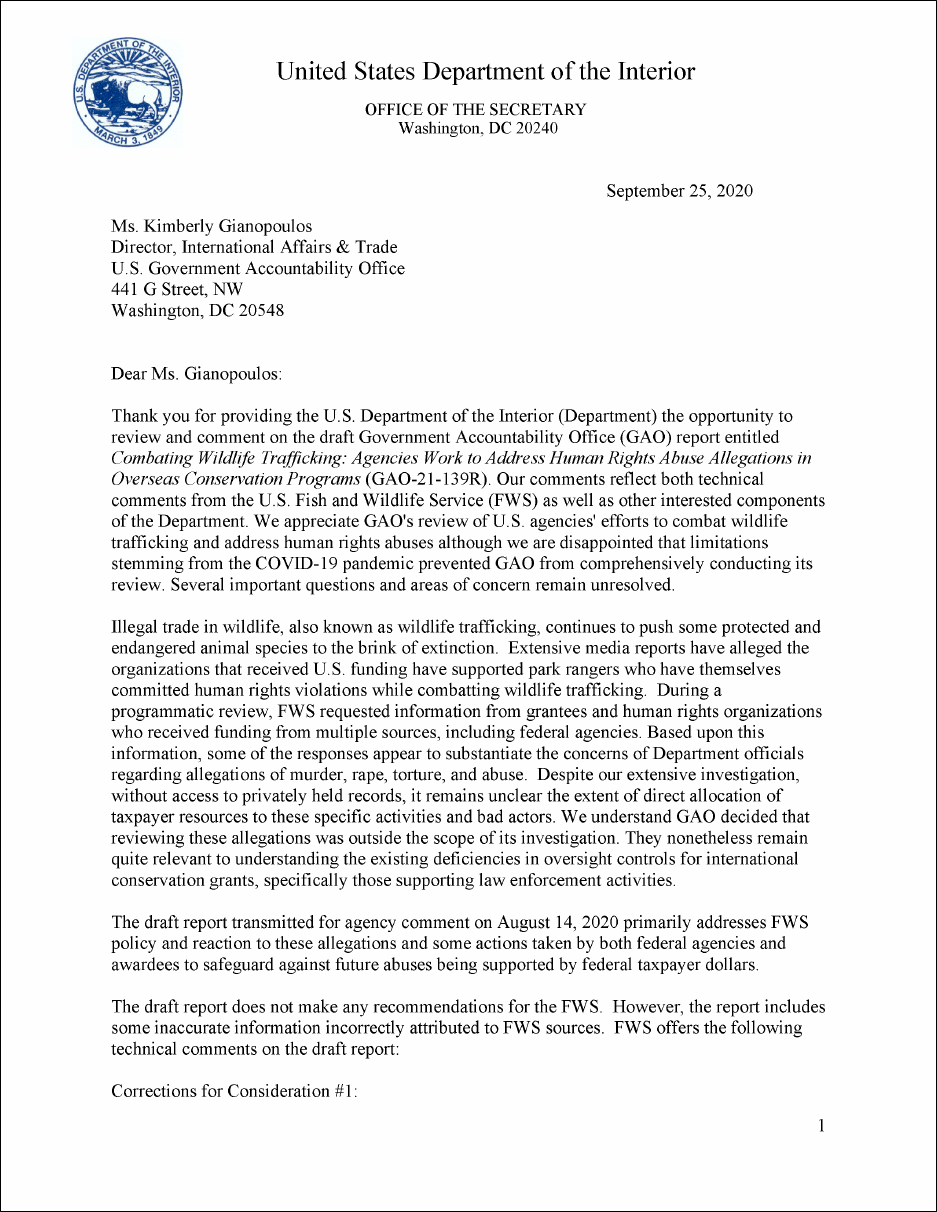
Page 9 GAO-21-139R Wildlife Trafficking and Human Rights
Enclosure I: Comments from the Department of the Interior
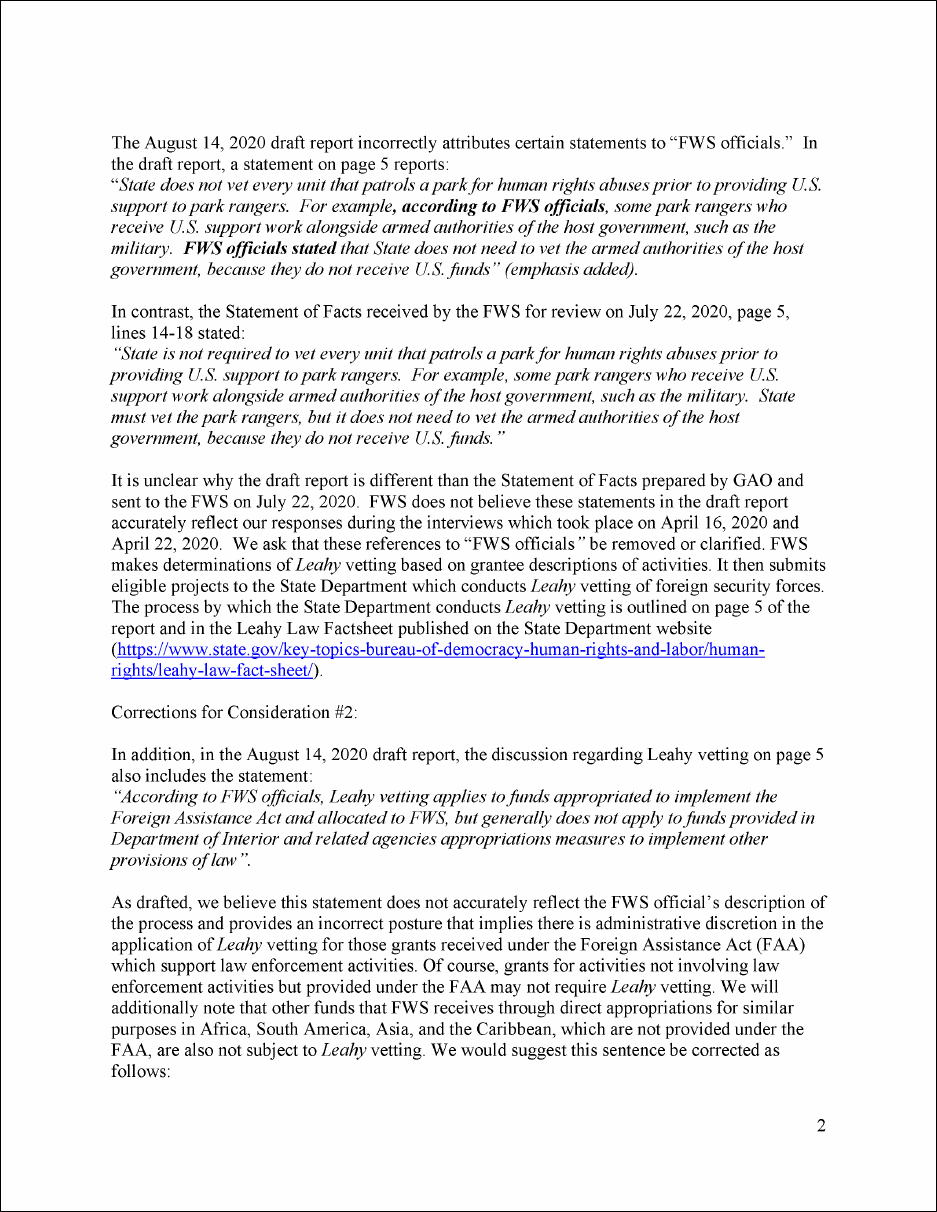
Page 10 GAO-21-139R Wildlife Trafficking and Human Rights
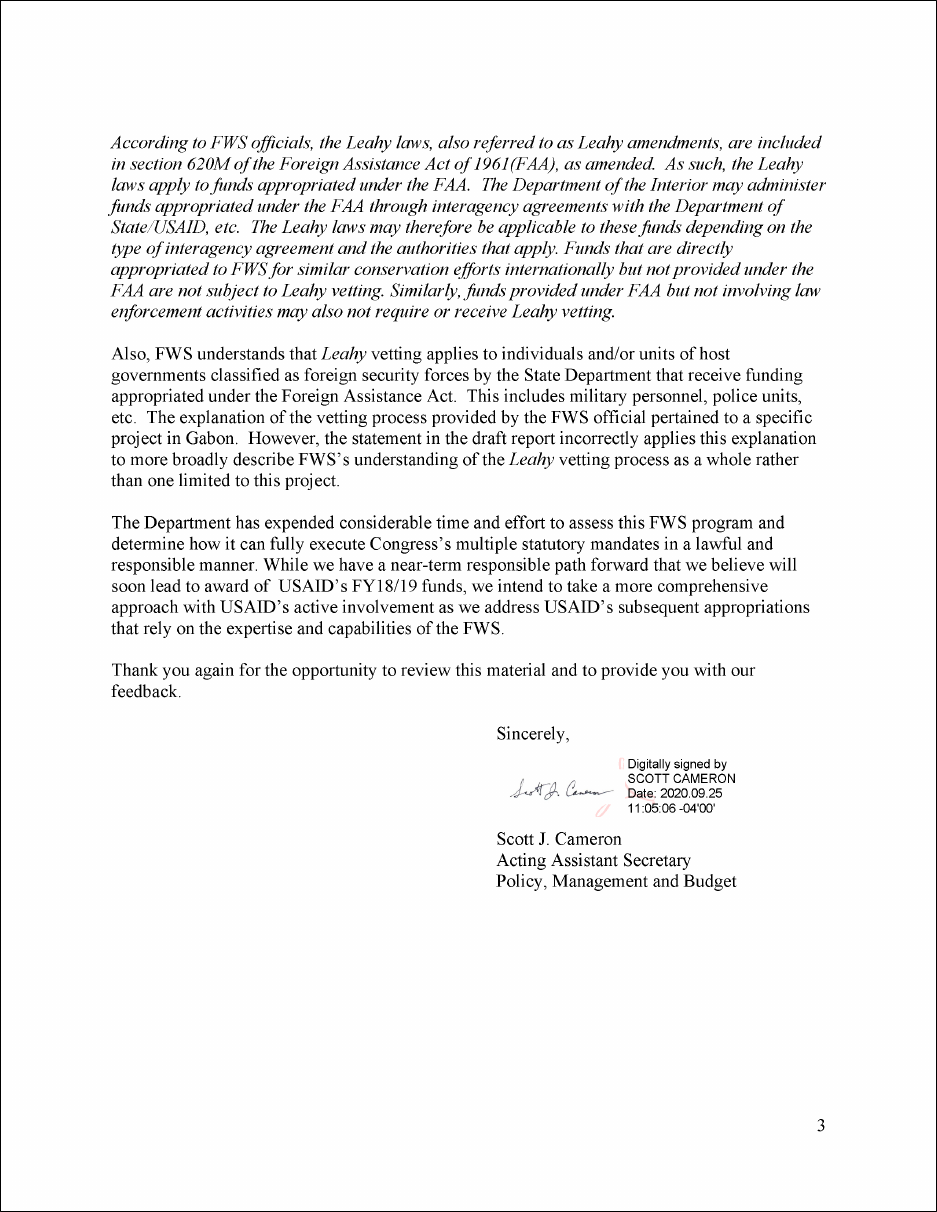
Page 11 GAO-21-139R Wildlife Trafficking and Human Rights
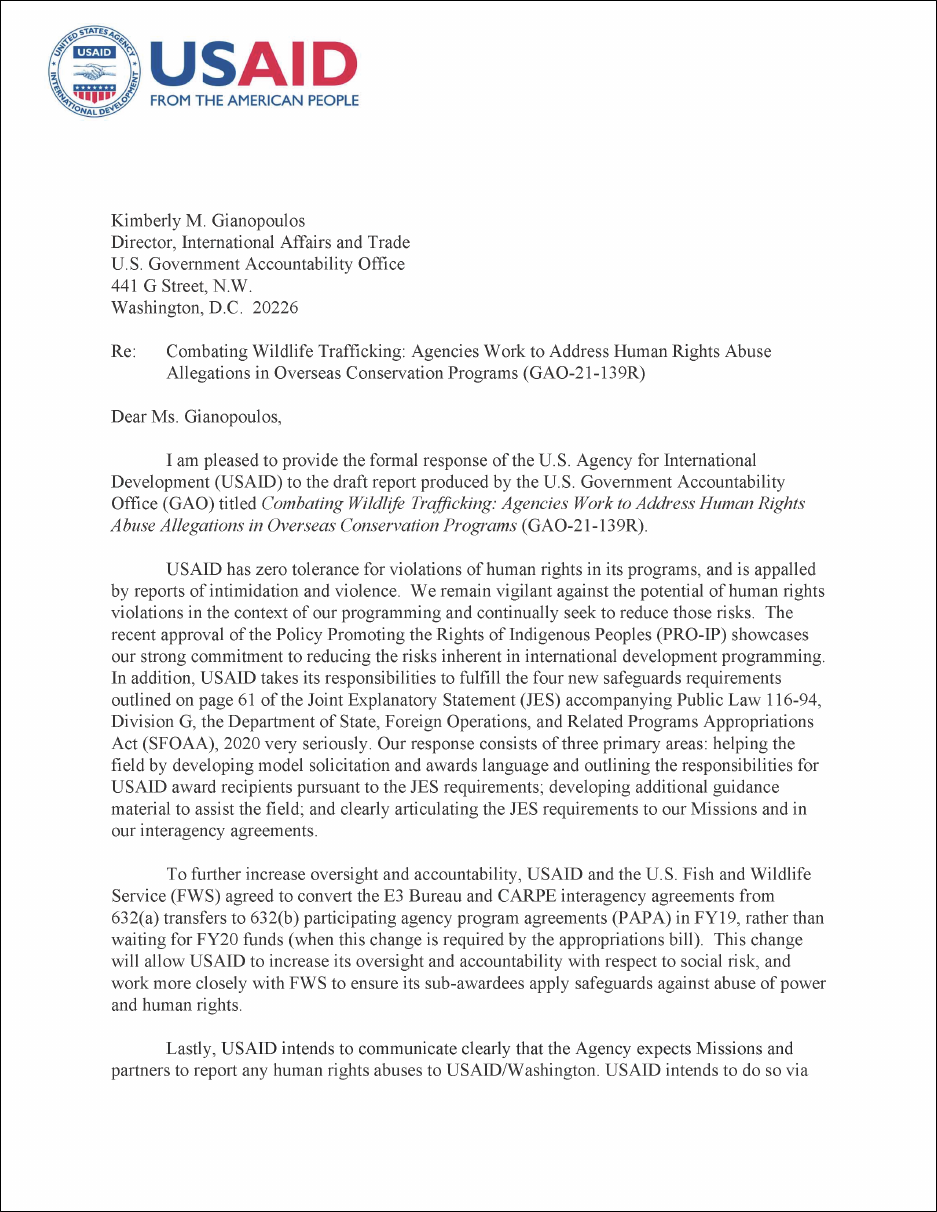
Page 12 GAO-21-139R Wildlife Trafficking and Human Rights
Enclosure II: Comments from the U.S. Agency for International Development
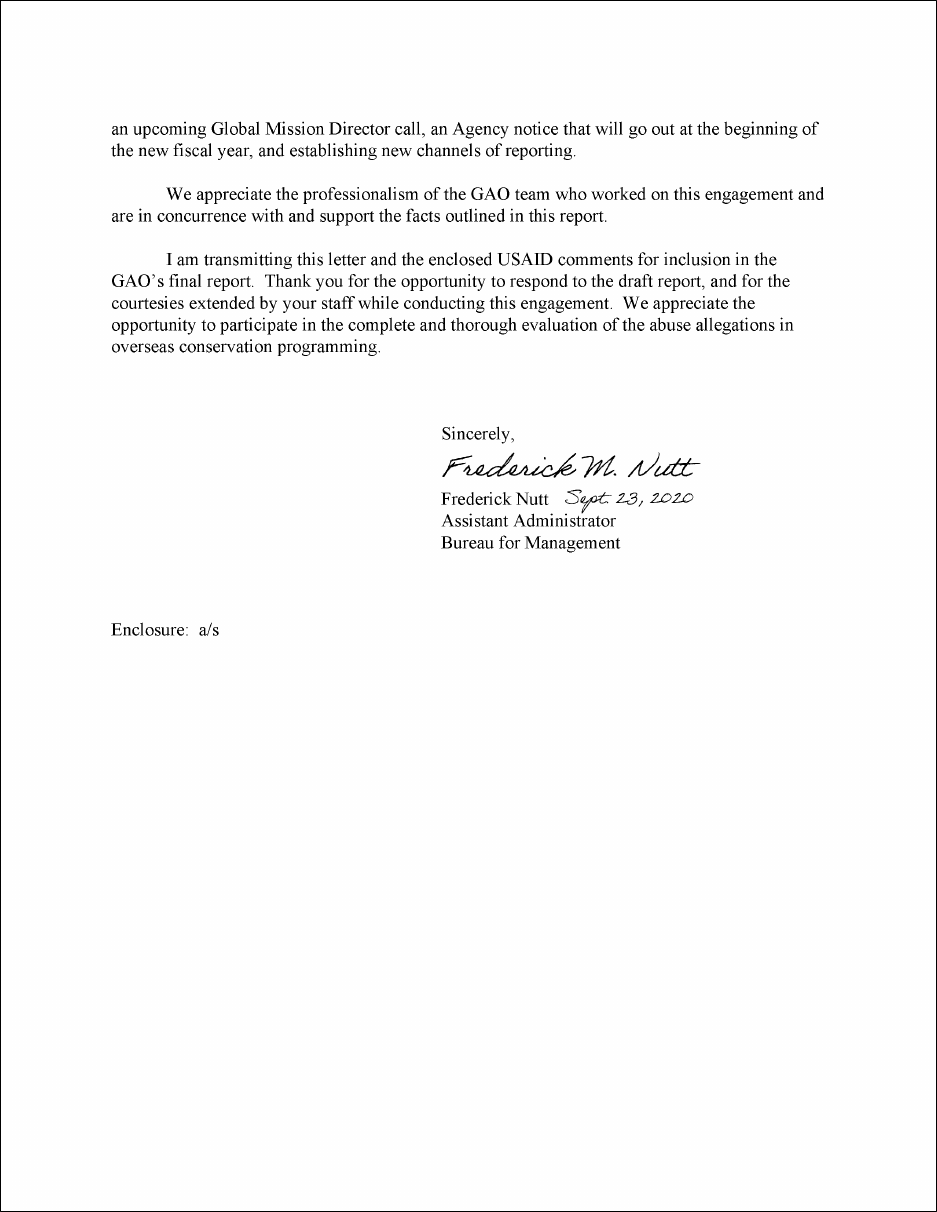
Page 13 GAO-21-139R Wildlife Trafficking and Human Rights
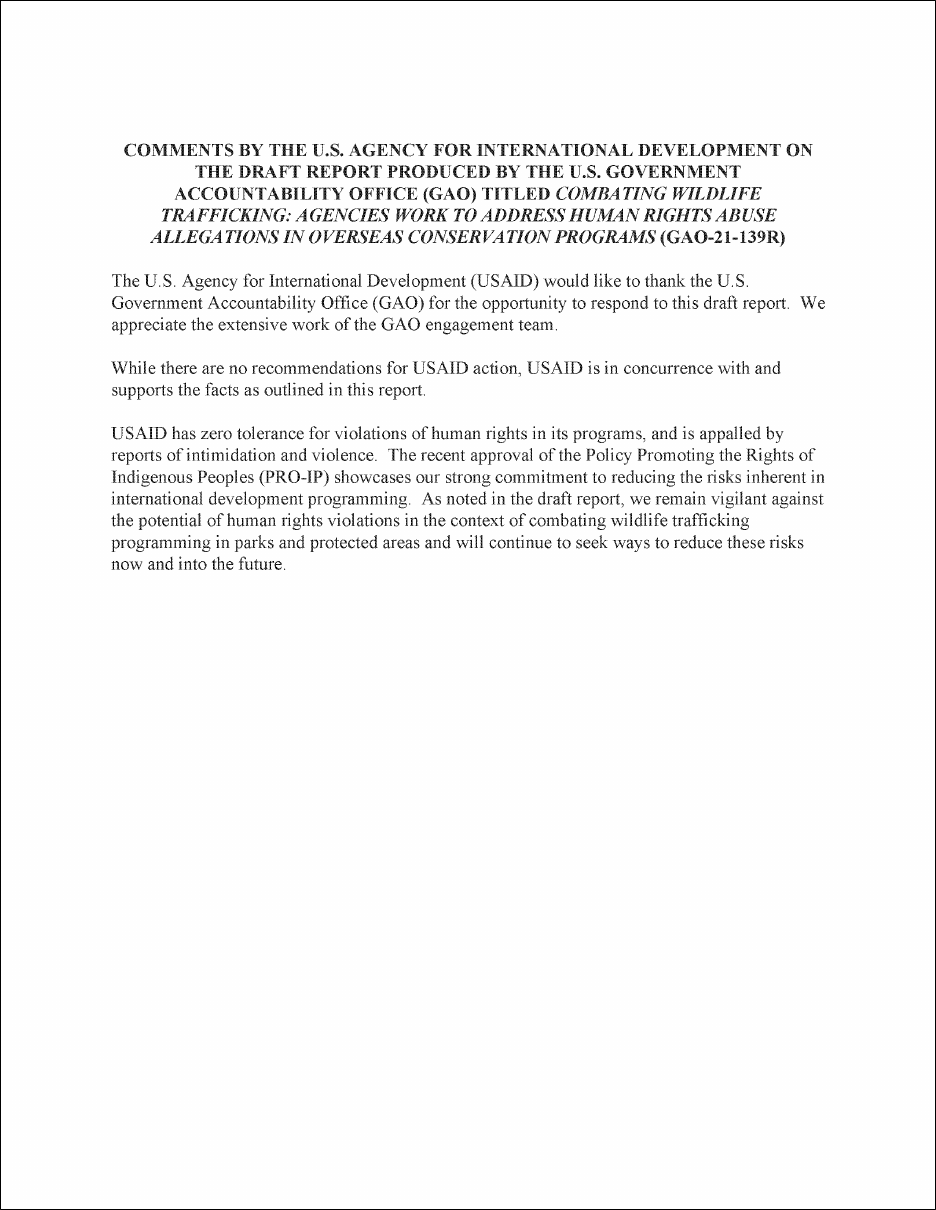
Page 14 GAO-21-139R Wildlife Trafficking and Human Rights
(103725)

This is a work of the U.S. government and is not subject to copyright protection in the
United States. The published product may be reproduced and distributed in its entirety
without further permission from GAO. However, because this work may contain
copyrighted images or other material, permission from the copyright holder may be
necessary if you wish to reproduce this material separately.
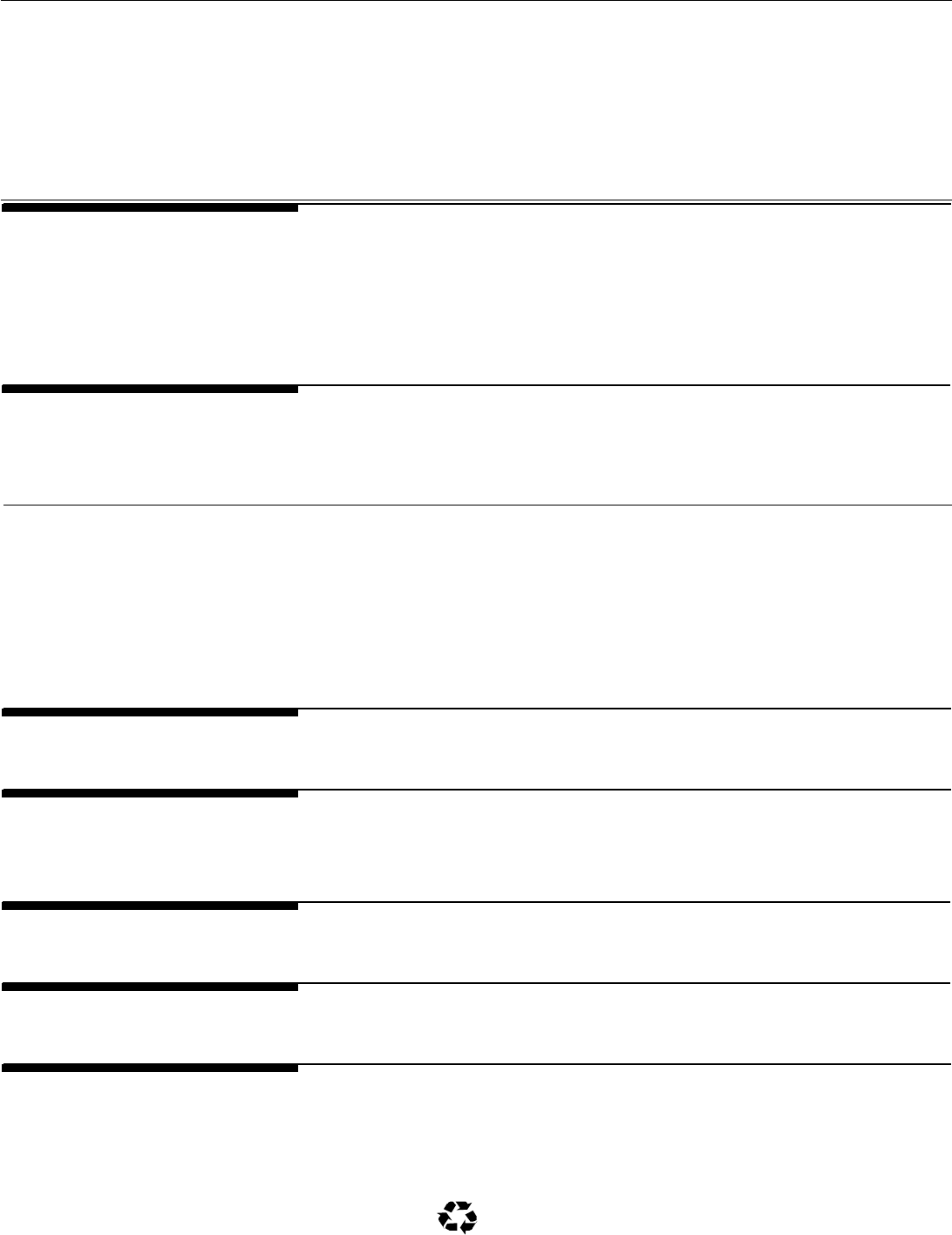
The Government Accountability Office, the audit, evaluation, and investigative
arm of Congress, exists to support Congress in meeting its constitutional
responsibilities and to help improve the performance and accountability of the
federal government for the American people. GAO examines the use of public
funds; evaluates federal programs and policies; and provides analyses,
recommendations, and other assistance to help Congress make informed
oversight, policy, and funding decisions. GAO’s commitment to good government
is reflected in its core values of accountability, integrity, and reliability.
The fastest and easiest way to obtain copies of GAO documents at no cost is
through GAO’s website (https://www.gao.gov). Each weekday afternoon, GAO
posts on its website newly released reports, testimony, and correspondence. To
have GAO e-mail you a list of newly posted products, go to https://www.gao.gov
and select “E-mail Updates.”
The price of each GAO publication reflects GAO’s actual cost of production and
distribution and depends on the number of pages in the publication and whether
the publication is printed in color or black and white. Pricing and ordering
information is posted on GAO’s website, https://www.gao.gov/ordering.htm.
Place orders by calling (202) 512-6000, toll free (866) 801-7077, or
TDD (202) 512-2537.
Orders may be paid for using American Express, Discover Card, MasterCard,
Visa, check, or money order. Call for additional information.
Connect with GAO on Facebook, Flickr, Twitter, and YouTube.
Subscribe to our RSS Feeds or E-mail Updates. Listen to our Podcasts.
Visit GAO on the web at https://www.gao.gov.
Contact FraudNet:
Website: https://www.gao.gov/fraudnet/fraudnet.htm
Automated answering system: (800) 424-5454 or (202) 512-7700
Orice Williams Brown, Managing Director, William[email protected], (202) 512-4400,
U.S. Government Accountability Office, 441 G Street NW, Room 7125,
Washington, DC 20548
Chuck Young, Managing Director, y[email protected], (202) 512-4800
U.S. Government Accountability Office, 441 G Street NW, Room 7149
Washington, DC 20548
James-Christian Blockwood, Managing Director, spel@gao.gov, (202) 512-4707
U.S. Government Accountability Office, 441 G Street NW, Room 7814,
Washington, DC 20548
GAO’s Mission
Obtaining Copies of
GAO Reports and
Testimony
Order by Phone
Connect with GAO
To Report Fraud,
Waste, and Abuse in
Federal Programs
Congressional
Relations
Public Affairs
Strategic Planning and
External Liaison
Please Print on Recycled Paper.
